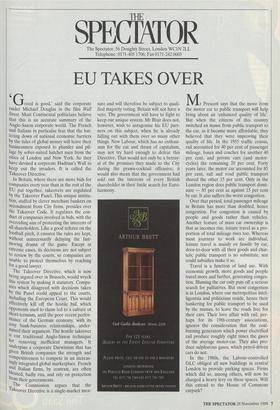SPE II CATOR The Spectator, 56 Doughty Street, London WC1N 2LL
Telephone: 0171-405 1706; Fax 0171-242 0603
EU TAKES OVER
Greed is good,' said the corporate raider Michael Douglas in the film Wall Street. Most Continental politicians believe that this is an accurate summary of the Anglo-Saxon corporate world. The French and Italians in particular fear that the bat- tering down of national economic barriers by the tides of global money will leave their businessmen exposed to plunder and pil- lage by sober-suited hatchet men from the cities of London and New York. So they have devised a corporate Hadrian's Wall to keep out the invaders. It is called the Takeover Directive.
In Britain, where there are more bids for companies every year than in the rest of the Ell put together, takeovers are regulated by the Takeover Panel. This unique institu- tion, staffed by clever merchant bankers on secondment from City firms, presides over the Takeover Code. It regulates the con- duct of companies involved in bids, with the overriding aim of protecting the interests of all shareholders. Like a good referee on the football pitch, it ensures the rules are kept, Without unnecessarily delaying the fast- nnoving drama of the game. Except in extreme cases, its decisions are not subject to review by the courts, so companies are unable to protect themselves by reaching for a good lawyer. The Takeover Directive, which is now being argued over in Brussels, would wreck this system by making it statutory. Compa- nies which disagreed with decisions taken hY the Panel could appeal to the courts, including the European Court. This would effectively kill off the hostile bid, which uPponents used to claim led to a culture of short-termism, until the poor recent perfor- mance of the German economy, with its Cosy bank-business relationships, under- Mined their argument. The hostile takeover is our traditional Anglo-Saxon technique for removing inefficient managers. It underpins a corporate Darwinism that has given British companies the strength and co, mpetitiveness to compete in an increas- ingly integrated global marketplace. French and Italian firms, by contrast, are often bloated, badly run, and rely on protection from their governments. The Commission argues that the akeover Directive is a single-market mea- sure and will therefore be subject to quali- fied majority voting. Britain will not have a veto. The government will have to fight to keep our unique system. Mr Blair does not, however, wish to antagonise his EU part- ners on this subject, when he is already falling out with them over so many other things. New Labour, which has no enthusi- asm for the cut and thrust of capitalism, may not try hard enough to defeat this Directive. That would not only be a betray- al of the promises they made to the City during the prawn-cocktail offensive; it would also mean that the government had sold out the interests of every British shareholder in their futile search for Euro- harmony. Mr Prescott says that the move from the motor car to public transport will help bring about an 'enhanced quality of life'. But when the citizens of this country switched en masse from public transport to the car, as it became more affordable, they believed that they were improving their quality of life. In the 1955 traffic census, rail accounted for 40 per cent of passenger mileage, buses and coaches for another 40 per cent, and private cars (and motor- cycles) the remaining 20 per cent. Forty years later, the motor car accounted for 85 per cent, rail and road public transport shared the other 15 per cent. Only in the London region does public transport domi- nate — 85 per cent as against 15 per cent by car. It also suffers the worst congestion.
Over that period, total passenger mileage in Britain has more than doubled, hence congestion. For congestion is caused by people and goods rather than vehicles. Another feature of mass car ownership is that as incomes rise, leisure travel as a pro- portion of total mileage rises too. Whereas most journeys to work are individual, leisure travel is mainly en famine by car, door-to-door with all their goods and chat- tels; public transport is no substitute, nor could subsidies make it so.
Travel is a function of land use. With economic growth, more goods and people travel more and further, generating conges- tion. Blaming the car only puts off a serious search for palliatives. But most congestion is in London, where our metropolitan intel- ligentsia and politicians reside, hence their hankering for public transport to be used by the masses, to leave the roads free for their cars. Their love affair with rail, per- haps for its 19th-century associations, ignores the consideration that the coal- burning generators which power electrified rail produce roughly eight times the gases of the average motor-car. They also pro- duce sulphurous gases, which petrol-driven cars do not.
In the 1960s, the Labour-controlled GLC obliged all new buildings in central London to provide parking spaces. Firms which did so, among others, will now be charged a heavy levy on these spaces. Will this extend to the House of Commons carpark?


























































































 Previous page
Previous page